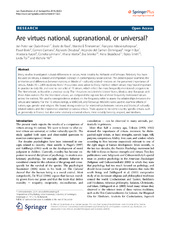| dc.contributor.author | van Oudenhoven, Jan Pieter | |
| dc.contributor.author | de Raad, Boele | |
| dc.contributor.author | Timmerman, Marieke E. | |
| dc.contributor.author | Askevis-Leherpeux, Françoise | |
| dc.contributor.author | Boski, Pawel | |
| dc.contributor.author | Carmona, Carmen | |
| dc.contributor.author | Choubisa, Rajneesh | |
| dc.contributor.author | del Carmen Dominguez, Alejandra | |
| dc.contributor.author | Bye, Hege Høivik | |
| dc.contributor.author | Kurylo, Anastacia | |
| dc.contributor.author | Lahmann, Cornelia | |
| dc.contributor.author | Mastor, Khairul | |
| dc.contributor.author | Selenko, Eva | |
| dc.contributor.author | Slezáčková, Alena | |
| dc.contributor.author | Smith, Ripley | |
| dc.contributor.author | Tip, Linda | |
| dc.contributor.author | Yik, Michelle | |
| dc.date.accessioned | 2014-10-22T13:12:55Z | |
| dc.date.available | 2014-10-22T13:12:55Z | |
| dc.date.issued | 2014-05-02 | eng |
| dc.identifier.issn | 2193-1801 | |
| dc.identifier.uri | https://hdl.handle.net/1956/8666 | |
| dc.description.abstract | Many studies investigated cultural differences in values, most notably by Hofstede and Schwarz. Relatively few have focused on virtues, a related and important concept in contemporary social science. The present paper examines the similarities and differences between nations, or blocks of - culturally related - nations on the perceived importance of virtues. Adults (N = 2.809 students) from 14 countries were asked to freely mention which virtues they found important to practice in daily life, and next to rate a list of 15 virtues, which reflect the most frequently mentioned categories in The Netherlands, as found in a previous study. The 14 nations included the United States, Mexico, nine European and three Asian nations. For the free-listed virtues, we compared the top-ten lists of most frequently mentioned virtues across the nations. We used a correspondence analysis on the frequency table to assess the relationships between the virtues and nations. For the 15 virtues ratings, a MANOVA, and follow-up ANOVA’s were used to examine effects of nation, age, gender and religion. We found strong evidence for relationships between nations and blocks of culturally related nations and the importance attached to various virtues. There appear to be some country specific virtues, such as generosity in France, but also some relatively universal virtues, most notably honesty, respect, and kindness. | en_US |
| dc.language.iso | eng | eng |
| dc.publisher | Springer | eng |
| dc.rights | Attribution CC BY | eng |
| dc.rights.uri | http://creativecommons.org/licenses/by/4.0 | eng |
| dc.title | Are virtues national, supranational, or universal? | eng |
| dc.type | Peer reviewed | |
| dc.type | Journal article | |
| dc.date.updated | 2014-05-14T15:06:22Z | |
| dc.description.version | publishedVersion | |
| dc.description.version | Peer Reviewed | |
| dc.rights.holder | Copyright 2014 van Oudenhoven et al.; licensee Springer | |
| dc.rights.holder | Jan Pieter van Oudenhoven et al.; licensee BioMed Central Ltd. | eng |
| dc.source.articlenumber | 223 | |
| dc.identifier.doi | https://doi.org/10.1186/2193-1801-3-223 | |
| dc.identifier.cristin | 1132823 | |
| dc.source.journal | SpringerPlus | |
| dc.source.40 | 3 | |

